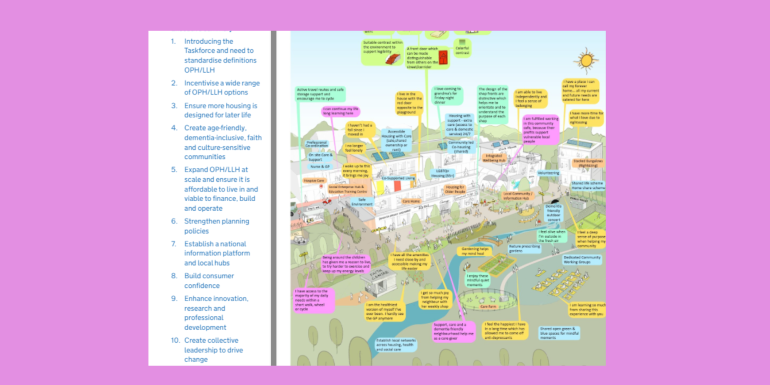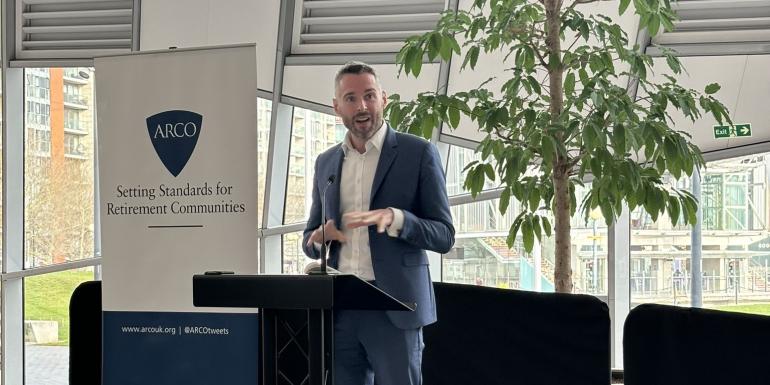Housing-with-care sector urges Liberal Democrats to be innovative about social care, as party’s conference begins
25.09.20
FOR IMMEDIATE RELEASE
Housing-with-care sector urges Liberal Democrats to be innovative about social care, as party’s conference begins
The Liberal Democrats have been issued an urgent challenge by the UK’s housing-with-care sector as its online conference gets underway, calling for the party to back new models of social care so that older people are not left behind again.
Spearheaded by representative body ARCO (Associated Retirement Community Operators), the challenge says that “the coronavirus crisis has brought into stark relief the need for our society to think again about care for older people”, and that “new, innovative ways of supporting, caring for and giving opportunities to older people” require immediate action.
With only 0.6% of over-65s having the opportunity to live in housing-with-care in the UK, ARCO’s challenge “calls for a commitment from the Liberal Democrats to support measures to help housing-with-care to significantly expand and to benefit hundreds of thousands more older people”. Countries like New Zealand, Australia and the US all have ten times the level of provision available in the UK per head of population.
A number of senior figures within the Liberal Democrats have already expressed their support for the growth of housing-with-care. Lord Shipley, the party’s former Spokesperson for Housing, is an official Parliamentary Supporter of ARCO’s mission for 250,000 people to live in housing-with-care by 2030.
Recently, the current Liberal Democrat Spokesperson for Housing, Tim Farron, and the party’s Spokesperson for Health and Social Care, Munira Wilson, both backed an Early Day Motion tabled in the House of Commons recognising the contribution housing-with-care has made in protecting older people during the coronavirus pandemic, and calling for measures to boost the sector’s expansion.
The sector’s challenge to the Liberal Democrats reads as follows:
“The coronavirus crisis has brought into stark relief the need for our society to think again about care for older people. We urgently need to find new, innovative ways of supporting, caring for and giving opportunities to older people so that they are not left behind again. In this context, housing-with-care needs to play a much bigger role in a diverse social care system which is built around the needs and choices of older people themselves.
“Housing-with-care settings, sometimes called extra care housing and retirement villages, have played a vital role supporting older people through the coronavirus pandemic. They bring a unique combination of independent living with 24/7 on site care and services, boosting health and wellbeing, saving billions for the NHS and social care system, and tackling loneliness.
“Yet just 0.6% of over-65s in the UK have the opportunity to live in housing-with-care.
“Our sector calls for a commitment from the Liberal Democrats to support measures to help housing-with-care to significantly expand and to benefit hundreds of thousands more older people – giving them the chance to be independent, healthy and well for longer.”
The housing-with-care settings operated by ARCO members are distinct from care homes in that they combine independent living with 24/7 CQC-registered domiciliary care, services and communal facilities. Residents have been shown to stay healthy and fitter for longer and spend less time in hospital and care homes, saving billions for the NHS and social care system. Housing-with-care settings have seen low morality rates during the coronavirus pandemic and have played a vital role in supporting older people.
Michael Voges, Executive Director of ARCO, said:
“We call on the Liberal Democrats to urgently support new models of social care that keep older people safe, improve their health and fitness, and take pressure off the NHS and social care system.
“The coronavirus pandemic has shone a light on the vital role that housing-with-care plays in effectively shielding older people while simultaneously promoting independence, active living and social connection. It is a national shame that only 0.6% of over-65s have the chance to live in this type of setting.
“We are really pleased that Lord Shipley is an official supporter of housing-with-care, and that a number of senior Liberal Democrats have backed the expansion of our sector. But now is the time for the party to take the next step and support specific measures which will enable housing-with-care to grow and benefit hundreds of thousands more older people.
“We are at a critical juncture for transforming the way we look after older people in this country, and political action cannot wait any longer.”
ENDS
For Further Information Please Contact
Gareth Lyon, Head of Policy and Communications, at garethlyon@arcouk.org or on 075350 88498
Notes to editors
- About ARCO: ARCO (the Associated Retirement Community Operators) is the trade association for operators of housing-with-care developments for older people. ARCO was founded in 2012, and is now comprised of 27 private and not-for-profit operators of Retirement Communities. ARCO represents approximately 50% of the Retirement Community sector. ARCO sets high standards, and all ARCO members must adhere to the externally assessed ARCO Consumer Code. ARCO does not represent the traditional retirement housing model where there are limited services and no care is available or care homes.
- About Retirement Communities: Retirement Communities typically consist of individual one or two bedroom flats or houses, located in a development with similar properties. Residents have access to a range of services and facilities, which will include optional on-site care, 24-hour staffing, and dining and leisure facilities, and may also include bars, gyms and craft rooms. Retirement Communities are also sometimes referred to as housing-with-care schemes, retirement villages, extra care housing, assisted living, or close care apartments. They sit in between traditional retirement houses (which have less extensive staffing and leisure facilities), and care homes, and can be in urban or suburban locations.
3. About Vision 2030: Vision 2030 is ARCO’s vision for 250,000 people to be living in retirement communities by 2030. The vision sets out ten areas of work for the sector in order to achieve this. These are:
- Development of a clear customer proposition
- Effective self-regulation
- Enhanced health and wellbeing
- Intelligent use of technology
- Flexible models of tenure
- Sustainable funding streams
- Sector-specific legislation
- Comprehensive and robust data
- Clarity in the planning system
- A highly trained workforce
For more information on Vision 2030, please contact Gareth Lyon, Head of Policy and Communications, at garethlyon@arcouk.org.
- Benefits of Retirement Communities:
- Meeting the needs of an ageing population: Older people need and want choice in their housing for later life. However, at present housing options for older people are limited. Retirement Communities are an important element of housing choice for older people. Developing the capacity of the Retirement Community sector is vital to ensuring that the UK’s housing market is fit to meet the needs of an ageing population.
- Promoting independence, security and wellbeing: Older people living in Retirement Communities are likely to experience lower levels of loneliness and social isolation. A 2014 study by the International Longevity Centre found that 82% of respondents in Retirement Communities said they hardly or never felt isolated, and only 1% often felt isolated.
- Reducing costs and encouraging more efficient use of resources: Residents in Retirement Communities are able to receive specialist care in their homes if needed, enabling them to return home from hospital earlier. They are also less likely to enter hospital. For example, one way in which Retirement Communities improve health is
- by preventing falls. Retirement Community properties are designed and built with adaptations to support independence and research shows that those living in these specialist homes are between 1.5 and 2.8 times less likely to have a fall than those living in homes without adaptations. This helps to reduce pressure on NHS services.
- A recent study found that NHS costs were reduced by 38% for those moving into Retirement Community housing and NHS costs for ‘frail’ residents had reduced by 51.5% after 12 months.
- Responding to the housing shortage: Older people moving to a Retirement Community will typically ‘downsize’, freeing up much needed and under-occupied family sized homes. If all those interested in moving into a retirement property were able to do so, research suggests that approximately 3.29 million properties would be released, including nearly 2 million three-bedroom homes.





